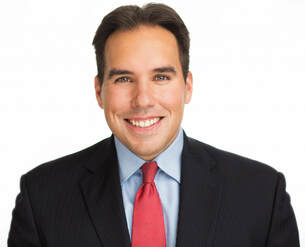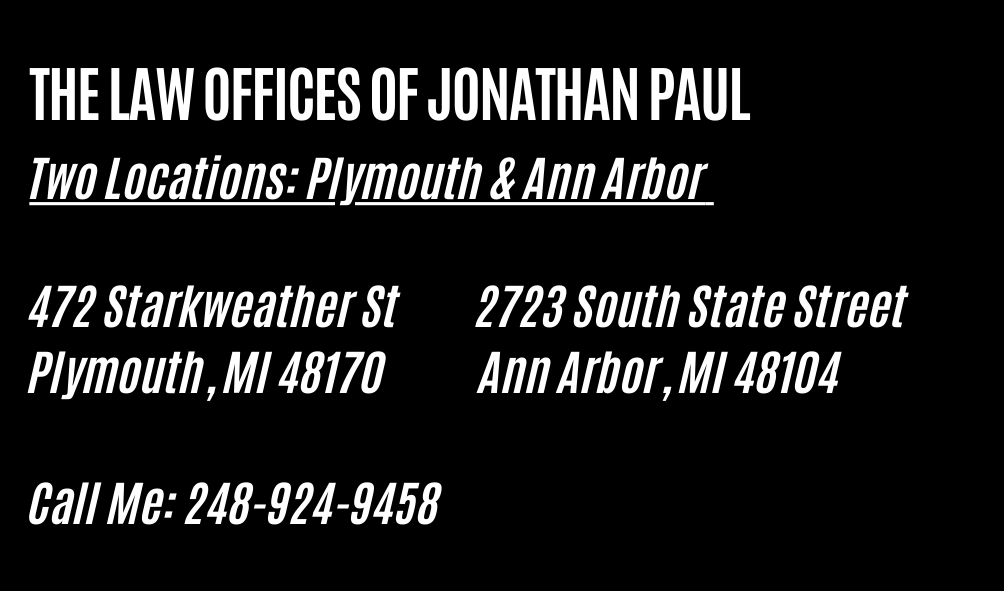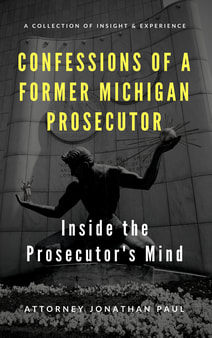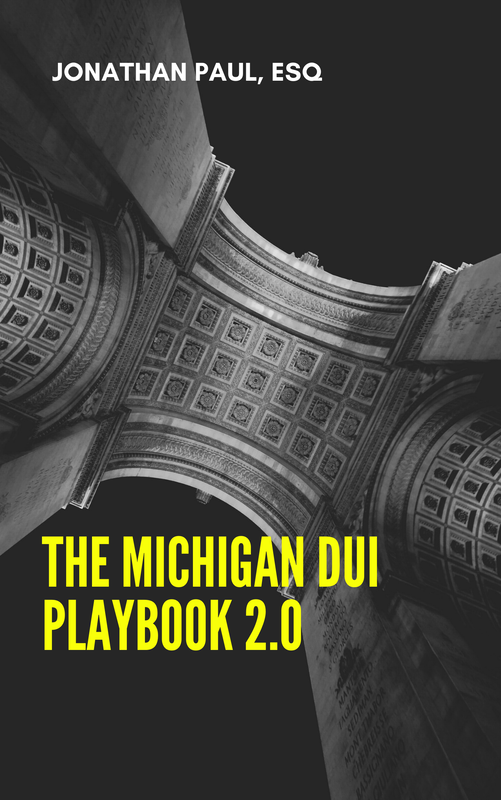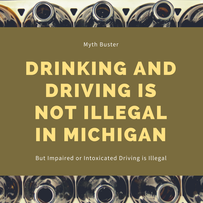 If you asked the average person this question: "is drinking and driving legal or illegal in Michigan" - close to 100 percent would say illegal. That answer is actually incorrect. As long as you are 21 years old, you are allowed to drink then drive a vehicle in Michigan - you can't drink while driving as that would be an open intoxicant in a vehicle, but prior drinking is not illegal. This act becomes illegal if that alcohol brings your blood alcohol content to 0.08 or above, or that alcohol causes your ability to drive to be impaired, which in Michigan the prosecution must prove beyond a reasonable doubt that the defendant's ability to operate was so weakened or reduced by the consumption of alcohol, controlled substances, or a combination of these that the operation was with less care than that used by an ordinary, careful and prudent driver". Police officers love to testify about alcohol odors, admissions of drinking, statements about coming from bars or nightclubs etc; if the jury is not properly educated on what a prosecutor must prove, these facts could be harmful to your case, but a properly educated jury who understands the true prosecutor's burden, will view these as simply no indication of breaking the law - you must draw a certain inference for them to be relevant to answer the question or guilt. When charged with a DUI in Michigan, there are a number of consequences; one of those consequences is impact on your driver’s license. The court has no say over what happens to your license, because the Michigan Secretary of State is the lone authority on what happens to your ability to drive if convicted of DUI offense.
The Michigan Secretary of State can only sanction a Michigan driver’s license, which means if you have an out of state license, Michigan cannot do anything other than control your ability to drive within the State, but not outside of the State. The Secretary of State can either restrict, suspend or revoke a driver’s license. A restriction allows some driving, typically to school, work, medical appointments, community service, counseling, court and a few other exceptions. A suspension can take away the driver’s ability to drive for a limited period of time, and once the time passes, the driving privileges resume. Revocation is a lifetime loss of driving privileges, but they can be restored by the Secretary of State at a future, but uncertain date. License impact depends upon the type of conviction. Here is a brief breakdown of the most common offenses. * Impaired Driving - 90 days restricted driving * Zero Tolerance - 30 days restricted driving * Intoxicated Driving/Drugged Driving - 30 day suspension, 150 days restricted * Super Drunk - 45 days restricted driving, 320 restricted with ignition interlock installed * Second Offense - 1 year suspension * Third Offense - license revoked, eligible to reapply after 1 year In Michigan, the criminal penal code says it’s a second offense if you have two convictions within seven years; the date of offense is used on the subsequent offense to make this determination. So if you were convicted on September 2nd 2001, you would fall into the second offense category if you are subsequently arrested on or before September 2nd 2008. For a third or more offense, there is no time limit; it’s simply within a lifetime. So you can have a conviction from 1950, 1999 and 2016. There isn’t much strategy in timing when it comes to the criminal code; the best approaches are defeating the case, or resolution with a reduction, sobriety court or sentencing agreement. While timing for the criminal code can’t be impacted, it is the exact opposite when it comes to the Secretary of State. The Secretary of State has the same seven year mark for second offenses, but they use the conviction date for measuring this period. This means that if you were convicted of a DUI on September 2nd of 2001, and subsequently arrested in the summer of 2008, there is a lot of strategy involved. If my client has decided to resolve the case or even go to trial, we make sure the “end” of the case takes place after September 2nd of that year, which would put us outside of the seven year window. The client if convicted would be treated as a first offender outside of the seven year window. This strategy could mean the difference between losing his/her ability to drive for a full year vs being restricted for 90 days. This same strategy is even more crucial when it comes to third offenses. Unlike the criminal penal code, the Secretary of State does use a ten year window. Many of my clients have two very old DUI’s from 10 to 20 years ago. While they will still be charged as a third offender, they can escape the license sanctions for a third offender with the right timing. There’s a chance a third offender could be treated as a second offender, or even a first offender with the right timing strategy. When charged with a DUI offense in Michigan, a client has two options. The client can sit back, let their attorney do their job, and hope that things work out in the end. The other approach has the client equally engaged on a daily basis; this is the proactive approach, which all of my clients must do from day one.
I am very selective in who I agree to take on as a client; I am looking for motivated clients who are looking to change the perception of their case on a daily basis. When a client is arrested and charged with a DUI, the perception of the police, prosecutor, judge and the community is my client is a dangerous person, and can’t be trusted to make good choices with alcohol or driving. When a client’s freedom and ability to drive can be taken away, it’s time to get serious about changing this perception. If I agree to take on a client, I provide the tools and resources for that client to be proactive on day one. Each case is different, and each program is customized, but generally the program involves an alcohol screening and assessment, alcohol education and/or treatment, attendance at AA meetings, proactive volunteer work, alcohol and drug testing among other components. If my client follows my lead, it helps open options for our case. All DUI cases in Michigan are either resolved with litigation (motions, hearings or trial) or resolution (plea bargain with prosecutor). As a former prosecutor in Michigan and New York City, I have worked out 1000’s of deals on both ends of the table. All cities, township and county prosecutors have a different litmus tests for plea bargaining, and each case is different. Most DUI cases have some ugly elements to it; prior criminal history, prior DUI history, high BAC reading, accident, client is under 21, rude behavior by my client to the police, along with a handful of other potential issues. When it comes to resolving these cases, I need to overcome many negative facts in my client’s case, and my words alone can only go so far. All clients have jobs they can’t lose, all clients need to drive to work and to take care of their family, nobody can afford to go to jail, and nobody wants a DUI on their record. These factors DO NOT make you unique when charged with a DUI. The more successful you are, the more professional licenses you hold, and the better career you have, the higher the standard is set by the prosecutor and judge. Just because you’ve been a doctor for 30 years, doesn’t mean a thing to a prosecutor; if anything it will be held against you for knowing better than getting yourself in this situation. While I present my client’s past, present and where they are going in the future, this is not enough to distinguish my client. Because my client has spent weeks if not months being proactive, I can drop these accomplishments on the prosecutor and distinguish my client from the other names in the prosecutor’s stack of files. These proactive accomplishments can be the difference between having or not having a drunk driving conviction on your record, losing or keeping your license, going to jail, having an interlock on your car for a year, having your car immobilized more points on your license, higher fines, costs and driver responsibility fees and other major differences. By following my proactive program, you are helping your case every single day, and putting yourself in the best position to reach the best resolution within the context of your case. As the client makes progress on the program, I proudly share this information with the prosecutor in order to educate them on how you are different than their typical case. I have set a high bar with past clients, so prosecutors are almost expecting my clients to be rock stars. I lay out the client accomplishments in a memorandum to the prosecutor along with proposed motion that I would file if the case cannot be resolved. As a former prosecutor I provide this information in a very respectful way to the other side, and keep the door open for resolution, but I am firm in the possibility of litigating the case. This approach gives my client the best of both worlds. Operating While Intoxicated
If the prosecution is able to prove that you were Operating a Motor Vehicle on a Highway Open to the Public, the final element that requires proof beyond a reasonable doubt is whether you breaking the law under three different theories - either "under the influence", operating with a blood alcohol content above 0.08 or a blood alcohol content above 0.17. The first theory Operating While Intoxicated "under the influence" is defined by the Criminal Jury Instructions as "Because of drinking alcohol, the defendant's ability to operate a motor vehicle in a normal manner was substantially lessened" - "To be under the influence a person does not have to be what is called dead drunk, that is falling down or hardly able to stand up. On the other hand, just because a person has drank alcohol or smells of alcohol does not prove, by itself, that the person is under the influence of alcohol. The test is whether, because of drinking alcohol, the defendant's mental or physical condition was significantly affected and the defendant was no longer able to operate a vehicle in a normal manner" The key to "under the influence" is you must be under the influence while driving your car. If the police make observations, administer field sobriety and chemical tests at a time after you were driving, then this evidence is less relevant the further away you get from driving the car. If there is evidence you were driving at 10 pm, but the police aren't involved until 11:30 then 90 minutes have gone by since the operation, and anything from 11:30 may not be relevant to your condition 90 minutes earlier. The reason this evidence may not be relevant, is because alcohol does not immediately peak after consuming; alcohol can take up to 60-90 minutes to peak in your system. If you consume a large quantity of alcohol then immediately jump into a car, your blood alcohol level is going to be a lot lower than it would be 60-90 minutes later. There is also the possibility that the driver drove then consumed the alcohol after driving; any observations or test results would then not be relevant to the condition, which the defendant drove the car, because the drinking occurred after the driving. If observations and tests are performed immediately after operation then there are still various ways to challenge "under the influence". Each Michigan drunk driving case is fact specific with strengths and weaknesses; your attorney will highlight factors that tend to show that you were not under the influence while driving, and your mental or physical condition was not significantly affected in operating a vehicle in a normal manner. Some factors may include the lack of bad driving, cooperation with the police, performing well on field sobriety tests. Remember, it is always the prosecutions burden to prove this element, but they will only highlight the negative factors to gain a conviction; your attorney must even out the playing field and tell the complete story. The second theory Operating While Intoxicated - Unlawful Bodily Alcohol Level - .08 at the time of operation This theory is based entirely on the chemical test results, which can be breath test, blood or urine sample, and is independent of the first theory of "under the influence". The prosecution will seek to admit the chemical test results to prove this element; it may be possible to challenge their admissibility and their accuracy if and when they are admitted. There are two ways to defeat the "per se" charge: The first way is to not challenge the actual test result, but challenge it's relevance to when the defendant was actually driving. If the defendant is driving at 10 pm, but the test is administered at 11 pm, then the result isn't actually what the driver would have registered at 10 pm. The test cannot prove what the defendant's blood alcohol was at 10 pm, but only at 11 pm. This could be very helpful if the blood result is in the 0.09 -0.11 range an hour later, because the blood alcohol could be rising, and was below 0.08 an hour earlier. The second way is to challenge the accuracy of the breath, urine or blood test. This tests can be challenged on the basis that procedures, safeguards, chain of custody and may other factors were not followed, and results are not accurate. An expert could testify, and re-create the defendant's consumption, and based upon all factors including the amount of alcohol, weight of the defendant and time considerations, what the defendant's blood alcohol was at the time of operation. If this result is different than the state's evidence, it might create reasonable doubt for an acquittal. Although both theories can be challenged, the jury only needs to find that either you were "under the influence" or had a blood alcohol level above .08. Here are the possible Michigan OWI Penalties for a first offender: - a $100 to $500 fine and one or more of the following: - Up to 93 days in jail. - Up to 360 hours of community service. - Driver's license suspension for 30 days, followed by license restrictions for 150 days. - Possible vehicle immobilization - Possible ignition interlock - Six points added to driving record - Driver Responsibility Fee ($1,000 for 2 consecutive years) Here are the possible Michigan OWI 2nd Offense Penalties - $200 to $1000 fine, and one or more of the following: - 5 days to 1 year in jail. - 30 to 90 days of community service - Driver's license revocation and denial for a minimum of 1 year (minimum of 5 years if there was a prior revocation within 7 years). - License plate confiscation. - Vehicle immobilization for 90 to 180 days, unless the vehicle is forfeited. - Possible vehicle forfeiture. - 6 points added to the offender's driving record. - Driver Responsibility Fee of $1,000 for 2 consecutive years. |
Click to Email Me Categories
All
|
Ann Arbor Office LocationPlymouth Office Location |
Representing DUI Clients in MichiganRepresenting clients charged with a DUI in Ann Arbor, Canton, Brighton, Howell, Saline, Adrian, Taylor, Plymouth, Northville, Westland, Ypsilanti, Pittsfield Towsnhip, Warren, Sterling Heights, Farmington, Pontiac, Romulus, Lansing, Novi, South Lyon, Southfield, Birmingham, Bloomfield Hills, Royal Oak, Troy, Rochester, Jackson, East Lansing, Garden City, Livonia, Dearborn, Detroit, St Clair Shores, Hazel Park, Ferndale, Madison Heights, Waterford, Milford, Shelby Township Clarkston, Oak Park, Berkley, Fraser, Sterling Heights, Clinton Township and others throughout Washtenaw, Wayne, Monroe, Jackson, Genesee, Macomb, Ingham, Lenawee, Livingston and Oakland County.
|


